This week we continue finding our way, sorting out our blogging, tweeting, meet a new web annotation tool, start taking on daily creative challenges, media creation, and exploring the “real” alchemy via a live twitter chat.
Yes, this post is gonna be a long scroller, but includes everything you will do for the next week. Kean students, your aim is to complete all work posted to your blog by next Tuesday, midnight EST.
Speaking of Blogging
If you are not set up yet for tweeting and blogging, stop reading this, and take a walk in The Labyrinthus.
Many of you are adept at blogging but maybe to this is your first effort. A theme this week is that the way you get better at something is small amounts of regular effort. Do not worry know about being a “great blogger” or your “audience”. Your blog is first for you as a way of working out (and sharing ideas). See some suggestions we assembled in How to Blog Like a Digital Alchemy Champion.
And now a rule about rules. Feel free to break rules here. Do an assignment the opposite. Bend and break rules– if it serves a meaningful and narrative purpose. All you have to do is explain (in your blog) your reasons why, or what came of breaking the rules.
We suggest from the outset thinking about organizing your blog posts as you write them. WordPress has categories and tags, Blogger has labels, tumblr has tags. For some assignments we will ask you to use a specific tag so we can see everyone’s work on the same idea in one place.
But think now of some organizing tags/categories for your work. We will ask you to write weekly reflection– so maybe tag all those posts “weeklies.” You will write up regular posts on media assignments. Think of a tag/category for those. Think of one you can use for “best stuff”. You can add them as you go, but keep track. By the end of this course, you will have many posts, and it may be hard to find them.
So coming up with your own organizing scheme at the outset (or as you go) will help you have an alchemy laboratory where you know where things are stored from months ago.
And media. Writing is very important, but we also want you to try using media, where meaningful (or fun) (or metaphorical) in you posts. You will notice in the place where posts are syndicated that this site will try and find an image to represent your posts. The image we use is the first image it finds in the body of your post. If you use WordPress and add a featured image to your posts, they look great, but featured images are not part of the data we get from your blog (ask Alan if you want a gory technical explanation).
And you can do more than images. Is it better to link to a YouTube video (and the person reading your site goes away) or to have it be part of your content? You can embed many media types in your blog.
Embedding media is easiest on WordPress blogs. It has a feature called oEmbed that lets you place videos, images, tweets, and more directly into your post– simply by putting the URL for those media types on a blank link (not linked) in your editor.
It’s like magic.
I just did it.
Now if you use another platform, you can still embed media- you need to look on sites for a thing called embed code to copy. It’s HTML code looking stuff. In your editor, you will need to switch to the mode where you can see the HTML. Just close your eyes, click, and paste.
It works with tweets too- for WordPress, you just need the link for single tweet (it is the link for the time/date stamp), copy that URL, put on a blank line, and a fully functioning tweet is in your blog post:
good morning! alchemical sunshine coming to you from Ripley Scroll! Generative Science by A Kitch article:https://t.co/HgqMqsOOgr #NetNarr pic.twitter.com/Uhg5ipoWok
— Laura Gibbs (@OnlineCrsLady) January 24, 2017
For other platforms, look for the little extra menu that provide an option to “Embed Tweet”.

Finding the embed code for a single tweet
Copy and paste that (using the HTML mode of your blog)- and put some tweets in your posts.
Meet The Daily Digital Alchemy
Like all those healthy habits– teeth brushing, exercise, vitamins– we believe your creative skills can grow by doing regular small acts of … making digital stuff. Each morning at 8:00 AM EST the Daily Alchemy site posts a new challenge (and it will be tweeted by @netnarr so make sure you follow us).
They are meant to be something you can do in maybe 20 minutes or less. it might be doing a photograph, writing a short poem, mashing up images, making an animated GIF. You are not graded or judged on your artistic chops, in fact more important is how creative you are in interpreting the challenge. There is no wrong way to do it.
The way you respond to a Daily Alchemy is via twitter. Because of some web alchemy, we are able to collect all the responses by hashtag (for example see all responses to #dda11). The magic requires the following:
- You must include
@netnarrin your tweet (the #netnarr tag is optional) - You must include the hashtag associated with each Daily (e.g.
#dda11) - It takes up to an hour to get found.
Sometimes your response will fit in a tweet; sometimes you will tweet a picture or a link. Sometimes you may have to write more, so you can use your blog to write a response and tweet that URL.
You do not have to do it the same day, you can go back and do ones you missed. And you do not have to do them all (but if you are competitive, we do have a leaderboard). Our Kean University students will have a certain number to do each each week, depending on their choice for a contract grade (that’s below).
And if you have an idea for a new Daily Alchemy, we have a place for you to slip in under the laboratory door.
Kean students will do #dda25 in class and will have a requirement to contribute a certain number of new ones over the length of the course.
Grading Contract
Contract? Grades? Fear not. Based on a concept outlined by Miriam Posner Kean University students will decide what grade they will aim to earn (A, B. or C) and sign a contract that outlines the requirements for each. We are offering them a chance to comment on a draft contract, which will be finalized after incorporating their comments and signed by them next week.
Open participants of course are free from contract, but an editable version is available if people want to make it more appropriate for them — maybe with something different to earn than letters?
Twitter Chat
To round out our understanding of the history and meaning of Alchemy, on Wednesday January 25 from 6:00-7:00PM EST we are running a live twitter chat, with questions brainstormed by Kean students. Our guests are two educators, one with a scientific background in it and another with a folklore/mythology approach.
See all the details https://netnarr.arganee.world/what-really-is-alchemy/
Setting up for Annotating with Hypothes.is

Hosted by @ClintLalonde @BCCampus ed tech demo: hypothes.is with @dr_jdean flickr photo by giulia.forsythe shared under a Creative Commons (BY) license
We are going to make much use in Networked Narratives of a tool that allows us to make highlights and add notes to any page on the web. But unlike doing this in a book or article, Hypothes.is enables social annotation, se we can see and interact with others annotating the same content.
Next week we will engage in a more in depth activity, but this week we want you to get set up and have some practice.
First go to https://hypothes.is/ where you can create a free account (if you already have an account, you can use it). You can also learn more about what it does.
There are a few ways you can activate the features; we set up the Networked Narratives site so it is available on every page. You know it’s active by the icons in the upper right corner:

Hypothes.is features are on
If you are not logged in, you can do so by clicking the top button with the arrow that opens the Hypothes.is tools.
The way you contribute is by selecting a few words or a sentence in the text. Hypothes.is will provide two tools. The highlight tool is useful for just marking key phrases (all your highlights are seen by just you, and stored in your account). The annotate tool is more interesting; it opens a composition box where you can write notes, questions, comments, even embed images (and GIFS!). Once other people annotate the same page, you can reply to their annotations.
You will notice a tags field. Can you anticipate what we will suggest? Yes- for any work you do in this course, please add netnarr as a tag to your annotations (we may have you use other ones, or you can make up your own). Tags are a way to connect this activity across the web.
It adds a rich layer of information atop the web page.
A page with a lot of activity will show as yellow highlights:
If you click any of the highlighted passages, the annotation activity will pop open on the right. This screenshot is from a draft description of this course, with notes added by colleagues around the world.
Your only task this week is to create your account, and practice adding annotations or commenting on the ones from other people, on this Week 2 page. Find some typos? Some better resources? More expanded information? Annotate away. Just play.
Four Elements Media Assignment
Now let’s make some digital art this week. We are not using fancy software, just whatever device you have available for taking digital photos. This is both an assignment to do and produce some photos, but we also want you to try to practice using your cameras for more than snapshots.
Even if you are a camera pro, you might find something new to try in our guide On Becoming Better Photographers. As you work on the photo assignment below, think about trying at least two of these techniques. It might be as simple as trying an unusual angle or maybe paying more attention to avoiding distractions in the background.
Now for the assignment. We ask you to find in the world around you (e.g. not on google) photos to represent for the four basic elements– fire, earth, air, and water. First look for literal examples. That’s easy. Find one of each. Then try to find maybe something more metaphorical or indirect suggestions for those elements.
This is not about getting a perfect score. If you cannot find all the photos, that’s okay. Write about the process of looking for them.
So you should end up with 8 photos, of your own. Write this up as a single blog post and tag it 4elements (we will see next week what we can do with that). In your post write about how hard / easy this was. Where did you find the items? Is there a connection?
Here are some examples– this is a bit of a cheat as I am using existing photos as examples– I will do all new photos this week myself!
Alan’s Fire, Earth, Air, Water Literally

Fire Season flickr photo by cogdogblog shared under a Creative Commons (BY) license

Balanced flickr photo by cogdogblog shared into the public domain using Creative Commons Public Domain Dedication (CC0)

2016/366/205 Turn up the Monsoon to 11 flickr photo by cogdogblog shared under a Creative Commons (BY) license

Water and Play flickr photo by cogdogblog shared under a Creative Commons (BY) license
Alan’s Fire, Earth, Air, Water …less Literally

Let Me Make The Fire flickr photo by cogdogblog shared under a Creative Commons (BY) license

Please, Do Not Remove the Earth flickr photo by cogdogblog shared under a Creative Commons (BY) license

Just Blowin’ Hot Air flickr photo by cogdogblog shared under a Creative Commons (BY) license

Dry as a …. flickr photo by cogdogblog shared under a Creative Commons (BY) license
Do not forget! Tag your blog post 4elements. When that happens, we can see everyone’s elements in one place https://netnarr.arganee.world/tag/4elements/
Looking Ahead: Our First Studio Visit
In February we are conducting a series of four visits to digital narrative practitioners. This will take place the Tuesday before class and will be streamed live (and archived) via Google Hangouts on Air. We have a few slots available for anyone who wants to join us for the visit, or you can also watch live via YouTube (or see the archive later).
We well then be running a discussion / twitter chat activity the next class. Our first visit is with Leonard Flores on Tuesday, January 31 — see the announcement for more details and how to participate.
Checklist for Week 2
- Make sure you are set up with twitter, tweeting, following other people in the class (and using/following the #netnarr hashtag). Also your blog should be at least set up, and have a few posts in it. If you have added it via the Labyrinthus make sure it is listed here https://netnarr.arganee.world/notebooks/ — if not contact @cogdog pronto!
- Complete 1-3 (or more go for bust) Daily Digital Alchemies. Make sure you are following us in twitter @netnarr so you can get tweets when the newest one is available. Our suggestion is to note it early in the day, but maybe just think about it as you go about your activities. Maybe an opportunity will present itself during the day.
- Review and comment on your grading contract. Think about which level you plan to aim on. You will be signing it next week!
- Participate live (or review later, we will provide an archive) in the What is Alchemy Twitter Chat. Keep in mind what new knowledge you have (or further questions) about alchemy.
- Create your Hypothes.is account and practice adding annotations or comments on this web page.
- Review the tips for On Becoming Better Photographers. Try one or two this week, either for the assignment or fun. Go the extra optional mile and write a blog post with an example of your own photo and a technique you tried, and or share it via twitter.
- Write a blog post with your Four Elements photos– and reflections on the process. Or the frustration. Tag your post
4elements - If you would like to be part of live Studio Visit with Leonardo Flores, sign up for a chance at the available spots.
- And…. write up a weekly reflection on what you did and thought this week. Link to examples of your work. What were your discoveries? Frustrations? What did you see interesting in other people’s work (hint- link to their work). Tag your posts
weeklies
Go out there and make some digital alchemy magic.
Featured Image: CC0 Public domain photo from pixabay




I slogged through most of https://en.wikipedia.org/wiki/Alchemy and came away with an uneasy feeling that it needs a critical review and edit.
What do (the royal) you think about using hypothes.is for the critical review as a #netnarr project?
Those still interested can then edit the wiki.
My view is that the progress (the royal) we have made separating the ‘charlatans’ from the ‘craftsmen’ (the terms used in the wiki) is being undone, largely with help of social media.
I appreciate the enthusiasm Mark, and this is a good thing that I can see our open participants perhaps rallying round. Especially if the information is weak.
My own opinion is that this is less of something I see, at least right off the bat, for our students. I am less interested in them coming to some authoritarian single definition of alchemy and first exploring their own meaning.
Also getting int wikipedia editing gets into a lot of process and politics with the way edits are monitored and acted upon.
I am not saying no, just need to think some more on this.